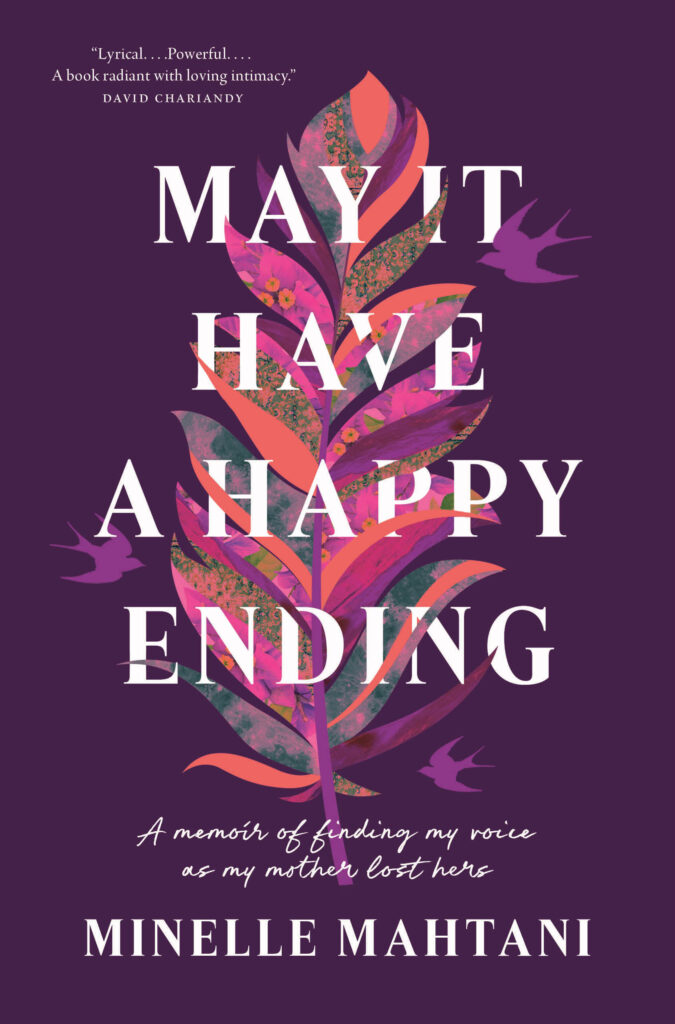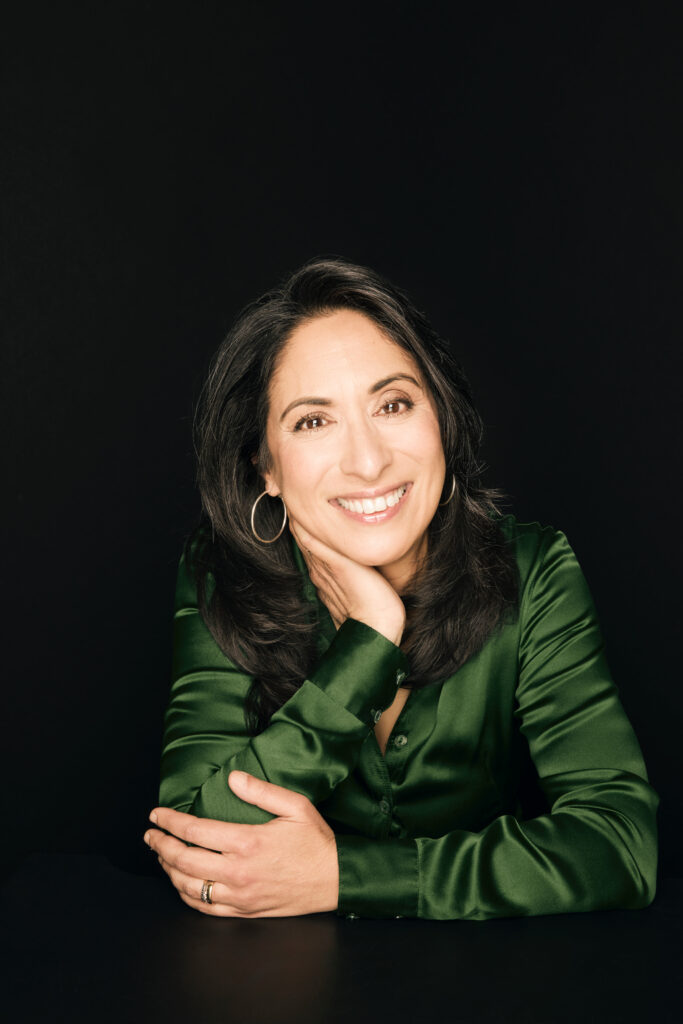Contemplating ‘multiple threads of identity’
May it Have a Happy Ending: A Memoir of Finding My Voice as My Mother Lost Hers
by Minelle Mahtani
Toronto: Doubleday Canada, 2024
$34.95 / 9780385675208
Reviewed by Catherine Owen
*

Most people whose mothers are still alive and aging contemplate their deaths: how they will feel in their absence, if they have regrets about things unsaid, questions unasked, and whether they are ready to contemplate this loss, often one of the most world-rupturing ones in a person’s existence.
My mother is still alive but this memoir certainly made me re-inhabit many of these thoughts and consider aspects of her I will remember when she’s gone: say a certain dish from childhood, a particular scent of perfume, her favourite flower. Minelle Mahtani’s May it Have a Happy Ending is a complex contemplation of multiple threads of identity: being a daughter and a mother, being mixed-race and religion (Iranian/East Indian/Muslim/Hindu), being a radio host in the process of learning her craft, and being in between cities due to work and family needs (Vancouver and Toronto). Then there is the core symbol of the tongue, its languages, its impediments, its truths, and its cancers.
Near the end of this compelling memoir, Mahtani states: “Maybe we can’t survive in wholes. Wholes are but a mirage, really. We can only survive in parts.” This seems to be the principle by which she has structured this text, in a multitude of titled segments, few longer than a couple of pages, most a smattering of paragraphs. I wondered about this decision throughout the book. The bite-sized chunks certainly make for a palatable, accessible reading experience, but sometimes I wanted fewer titular interruptions when perhaps spaces or an asterisk might have sufficed. Mahtani further mentions Steven Jackson’s notions of “broken-world” thinking and the Japanese practice of “kintsugi” in this same segment and although it’s becoming a cliché to make the latter comparison, elaborating a narrative in sections remains an engaging way of presenting difficult-to-absorb emotional material.

Each of the seven parts deal with silence and sound, life and death. Mahtani travels back and forth in time in this memoir, framing the episodes from her childhood, with an ex-partner, and during her new job, with how her family responded, how she herself was shifting in her capacity for tenacity and confidence, and what was happening with her mother at the time, from the eventual divorce from Mahtani’s father to her work in Montessori to her struggles with tongue cancer and their attempts at cure (including the apparent scam of a pricy German clinic called Infusio). Mahtani’s own challenges from her youth with a mixed-race identity (“Mom what does tigger mean? Am I one?”), her body (her feeling that she has “always been uneven” to a “mini-stroke” to shaking hands and an attack of shingles from stress), and her ability to vocalize honestly (radio “missteps” leading her to eventually gain enough guts to ask her initially-curmudgeonly boss Don to allow her to alter her on-air format from regular interviews to true conversations), renders the overall tone one of expressed vulnerability. Her awareness of her reader’s needs is made overt throughout the narration as Mahtani frequently directs comments or questions to the projected reader, anticipating them requiring certain information or beckoning them into a textual relationship where they are deeply aware of her own implications. For instance, she will say: “This is the story I didn’t want to tell you. You have stories like that too, right? Stories you want to keep hidden?” or “This is the part I’m embarrassed to tell you,” or she will ask, “Do you remember the last meal you ate with someone you loved before they died?” As she realizes earlier, “What is each question if not a wish?” Then, she connects this mode of approach to the act of trust, the means of gaining it and preserving it as a key ingredient in the dish of friendship.
Mahtani is truly aiming to accomplish a lot with May it Have a Happy Ending and the threads of family, illness, work, and other elements take their turns in the spotlight, then drift through the background, reminding us that we are always composed of a range of tales, that nothing is exclusive or simple or from which we are easily healed. Although the story may go on too long, the power of its narrations is here in her willingness to be utterly human: tired, distracted, manipulative, superior, fragile, needy, dismissive, and passionate. She also reveals her obsession with counting, horoscopes, feathers, and other means of controlling fate or overcoming grief that she practices. At the close of this moving memoir, Mahtani gets married to her long-term partner Bruce, the father of their young son, Cole, obtains a dream job, and finds a memorable recipe for khao-swe, saying that although her mother may have “lost her ability to speak…her voice lives on in all these different ways.” May it Have a Happy Ending thus does provide a happy ending, the happiness stemming not from perfection or wholeness, but from an acceptance of flaws and fragments, from a deep acknowledgement of the value of truly human bonds.

*

Catherine Owen was born and raised in Vancouver by an ex-nun and a truck driver. The oldest of five children, she began writing at three and published at eleven—a short story in a Catholic school’s writing contest chapbook. Since then, she’s released fifteen collections of poetry and prose, including essays, memoirs, short fiction, and children’s books; her latest are Moving to Delilah (Freehand Books, 2024) and The Weather Says (Carbonation Press, 2024). She also runs Marrow Reviews, the podcast Ms Lyric’s Poetry Outlaws, the YouTube channel The Reading Queen, and the performance series, 94th Street Trobairitz. She currently teaches at Concordia University and NAIT. [Editor’s note: Catherine Owen has also reviewed books by Eve Joseph, Julie Paul, Sharon McCartney, Andrea Scott, Tom Wayman, and Chris Walter for The British Columbia Review.
*
The British Columbia Review
Interim Editors, 2023-25: Trevor Marc Hughes (non-fiction), Brett Josef Grubisic (fiction and poetry)
Publisher: Richard Mackie
Formerly The Ormsby Review, The British Columbia Review is an online book review and journal service for BC writers and readers. The Advisory Board now consists of Jean Barman, Wade Davis, Robin Fisher, Barry Gough, Hugh Johnston, Kathy Mezei, Patricia Roy, Maria Tippett, and Graeme Wynn. Provincial Government Patron (since September 2018): Creative BC. Honorary Patron: Yosef Wosk. Scholarly Patron: SFU Graduate Liberal Studies. The British Columbia Review was founded in 2016 by Richard Mackie and Alan Twigg.
“Only connect.” – E.M. Forster